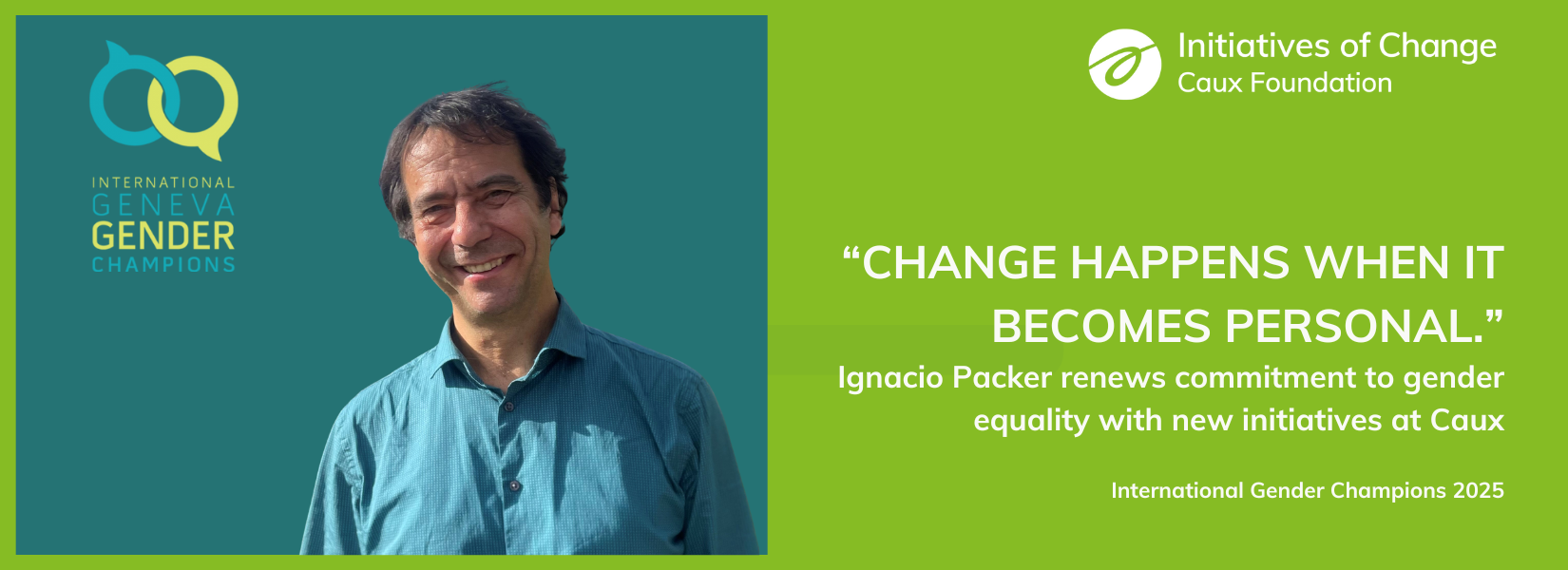"Change Happens When It Becomes Personal"
Ignacio Packer Renews Commitment to Gender Equality with New Initiatives at Caux
02/07/2025
“Change in the system happens when it becomes personal. When it is about who I am and what is my intention.” With these words, Ignacio Packer, Executive Director of Caux Initiatives of Change, reaffirmed his personal and professional commitment to advancing gender equality — renewing his pledge as part of the International Gender Champions (IGC) network.
On the occasion of the 10th anniversary of the International Gender Champions on 3 July 2025, Ignacio Packer announced an ambitious set of actions to be implemented throughout 2025. As a continued signatory of both the IGC Panel Parity Pledge and the IGC Pledge on Gender-Based Violence, he emphasized that meaningful change must be rooted in intention, accountability, and action.
A Gender-Inclusive Facilitation Framework for 2025
As a key step toward institutional transformation, Caux Initiatives of Change will develop and pilot a gender-inclusive facilitation framework to be implemented at all major events hosted or co-hosted at the Caux Palace and in Geneva.
This pioneering framework will ensure:
-
At least 50% gender-balanced representation among moderators and facilitators
-
Clear guidelines on inclusive language in all communications and facilitation
-
A participant feedback loop to assess gender safety and representation in real time
These practices aim not only to improve the participant experience but to set a new standard for inclusive, gender-sensitive facilitation in peacebuilding and dialogue spaces.
Gender Accountability Champions: Leadership from Within
In a move toward distributed responsibility, Caux Initiatives of Change will also appoint Gender Accountability Champions within the Caux Forum and events and encounters at the Caux Palace planning teams by the end of 2025.
These champions will:
-
Receive specialized training in gender-sensitive programme design, facilitation, and reporting
-
Ensure that each event has at least one concrete gender equality objective
-
Submit a Gender Inclusion Reflection Report after each forum, feeding directly into Caux Initiatives of Change’s broader impact reviews
This model reflects a shift from top-down directives to embedded leadership at every level, helping ensure gender equality is not an afterthought but a central pillar of all activities.
Advancing Women’s Rights at the Heart of Peace and Justice
These renewed efforts underscore Caux Initiatives of Change’s long-standing commitment to women’s rights and leadership in peacebuilding, dialogue, and reconciliation processes. With a strong zero-tolerance stance against gender-based violence and a concrete framework for inclusive practice, the organization is walking the talk — not only setting goals but building mechanisms to make them stick.
As the International Gender Champions celebrates a decade of global action, Ignacio Packer’s renewed commitment serves as a reminder that real change requires personal investment and systemic follow-through. At Caux, gender equality is no longer just a value — it’s a structure, a standard, and a shared responsibility.
____________________________________________________________________
Read Ignacio's full personal commitments:
In 2025, Caux Initiatives of Change will develop and pilot a gender-inclusive facilitation framework to be applied during all major events organized or co-organized by Caux Initiatives of Change at the Caux Palace and in Geneva. This framework will ensure: at least 50% gender-balanced representation among moderators and facilitators, clear guidelines for inclusive language, and a feedback loop to track participants’ experience regarding gender safety and representation in facilitation.
By the end of 2025, Caux Initiatives of Change will designate Gender Accountability Champions within the Forum and Encounters planning teams. These champions will: receive targeted training in gender-sensitive programme design, facilitation, and reporting, ensure that each event includes at least one concrete gender equality objective, from speaker balance to inclusive participation mechanisms, and be responsible for submitting a short gender inclusion reflection report after each forum, to feed into the impact review. This internal leadership model will help embed gender equality into the DNA of our Forums and Encounters and support the wider goal of organizational transformation through distributed responsibility.
